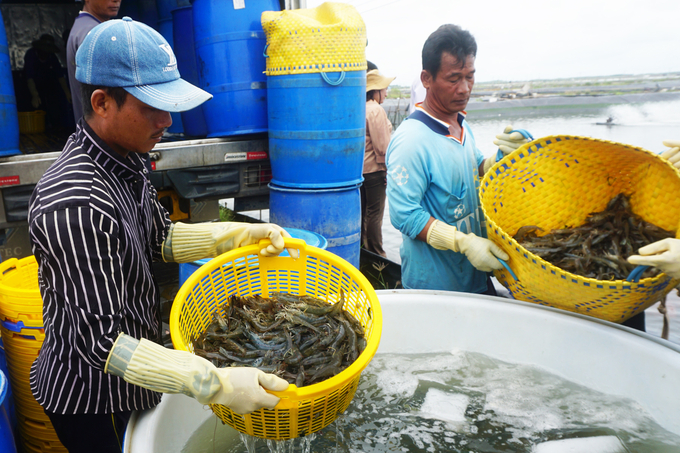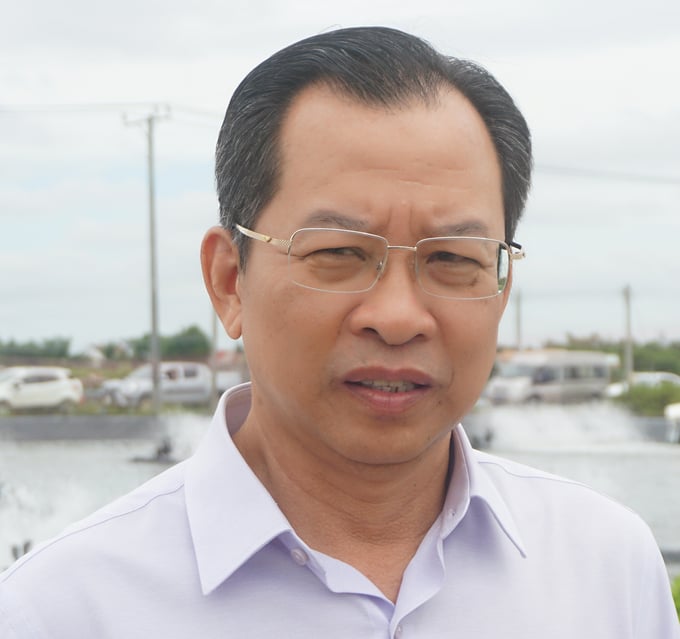June 17, 2025 | 20:40 GMT +7
June 17, 2025 | 20:40 GMT +7
Hotline: 0913.378.918
June 17, 2025 | 20:40 GMT +7
Hotline: 0913.378.918
Soc Trang has a sizeable brackish water shrimp farming area at the mouth of the My Thanh River and along the East Sea. After 30 years of restructuring production, Soc Trang is one of the provinces that shape the area of intensive and semi-intensive shrimp farming on 53,000 ha. Black tiger shrimp and white leg shrimp are the two main cultured objects. The current farming area of white-leg shrimp is over 40,000 ha.
Significantly, in the past 10 years, white-leg shrimp farming activities applying high technology have received continuously expanding investment from businesses and cooperatives, forming many large-scale farms of hundreds of ha. The method of shrimp farming is gradually shifting from earthen ponds to ponds with canvas bottoms in 2 and 3 stages. Large-scale shrimp farms focus on installing many automatic devices to control shrimp feed and monitor the environment during the farming process. Up to now, the high-tech farming model shows the ability to adapt to climate change, with little risk of disease. The result is high productivity and the quality of farmed shrimp also meets the requirements of export market standards.
Among businesses investing in industrial shrimp farming in Soc Trang, Sao Ta Food Processing Joint Stock Company (FMC) is one of the businesses promoting its strengths in the seafood processing industry for export. Sao Ta Food Processing Joint Stock Company (FMC) also connects the production chain from the large shrimp farming area.
Choosing a favorable location in the coastal area of the East Sea in Vinh Chau Town (Soc Trang), since 2012 FMC has started to invest in intensive shrimp farming applying high technology and large-scale production. After many years, FMC's shrimp farming area is constantly expanding. Up to now, FMC has a large shrimp farming area on a total area of 270 ha with 400 shrimp ponds, divided into 3 farms. They are Tanafarm with 160 ha formed in 2012, Vitafarm with 20 ha formed in 2017, and Honofarm with 90 ha formed in 2020.

The shrimp farm of CBTP Sao Ta Joint Stock Company during the harvesting process. Photo: Huu Duc.
FMC shrimp farming area applies intensive shrimp farming technology from micro-organisms produced by FMC with about 8,000 liters/day. This intensive shrimp farming technology includes bacillus strains to balance pond bottom nutrients. The bacillus strains also control the growth of harmful bacteria and increase digestibility for shrimp.
Mr. Hoang Thanh Vu - Deputy General Director in charge of FMC said that: The farming areas prioritize biosecurity for all farms with an anti-bird net system, a system of walls covering the ponds against outside penetration that can infect bacteria and viruses. Especially, the farming areas also attach importance to ensuring a stable and sustainable development environment.
FMC strives to maintain recognized quality standards such as ASC, BAP...
In recent years, FMC's farmed shrimp production varies from 6,000-8,000 tons/year and is striving to increase to about 10,000 tons/year, meeting 20% or more of FMC's processing plant demand. In the future, FMC will double the shrimp farming area, striving for a 30-35% increase in active raw materials for FMC's processing plant.
Mr. Vuong Quoc Nam - Vice Chairman of Soc Trang Provincial People's Committee:
Currently, there isn't much available land area for planning shrimp farming left, so we have to invest in high technology to increase productivity and export quality. For generations, people have stably invested in farming areas. As a consequence, planning the farming area requires investment in infrastructure: Traffic and irrigation suitable for transportation. Soc Trang province is currently planning about 52,000 ha of shrimp farming. In the near future, the province's policy will gradually switch from earthen ponds to industrial tarpaulin ponds. The changes will result in an increase in productivity.

Mr. Vuong Quoc Nam - Vice Chairman of Soc Trang Provincial People's Committee. Photo: Huu Duc.
The province aims to produce about 190,000 tons of brackish water shrimp/per year to ensure the supply of raw materials to meet export processing factories. In order for the province's shrimp industry to develop, it is necessary to invest in a system of value-added seafood processing factories and connect many markets. Therefore, the province is very interested in the development of industrial shrimp farming in the near future.
Translated by Hoang Duy
/2025/06/12/3721-2-202745_83.jpg)
(VAN) TH made an impression at Seoul Food 2025 with its line of natural beverages, paving the way for Vietnamese food products to enter the South Korean market.

(VAN) Soc Trang's success in rice exports stems from a strategy of developing fragrant and specialty rice cultivation areas and standardizing production toward low-emission practices.
/2025/06/11/1311-5-120811_839.jpg)
(VAN) The pig farming industry is facing the challenge of comprehensive restructuring to meet requirements for quality, safety, traceability, and market expansion both domestically and for export.

(VAN) Vietnam considers participating in ALGROALBA in order to expand agricultural production, coordinate the assessment and effective exploitation potential land.
/2025/06/05/5314-1-184727_407.jpg)
(VAN) From seemingly worthless fish scales and skin, enzymes and lactic ferments can transform by-products into peptides, opening a sustainable, effective business direction and elevating Vietnamese seafood.

(VAN) TTC AgriS and IFC signed a strategic partnership to develop a sustainable agricultural value chain, aiming to achieve the Net Zero target by 2035.

(VAN) Seafood by-products are opening a new path, combining green growth and technological innovation to enhance the industry's value.